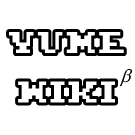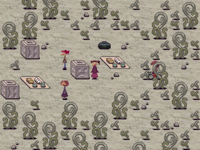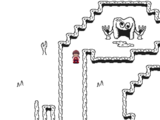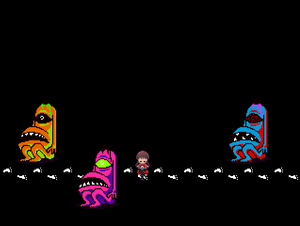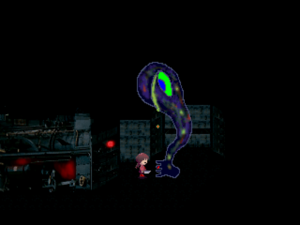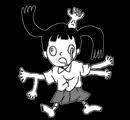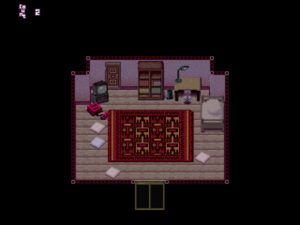mNo edit summary |
(Splitting this section into their respective pages (if they aren't already mentioned on them).) |
||
| Line 120: | Line 120: | ||
However, during the ending, two [[Yume Nikki:Jellyfish|Jellyfish]] appear, while the ending supposedly takes place in the real world. This has raised doubts as to whether the ending is real or just another dream. In fact, some fans believe that Madotsuki is dreaming at every point in the game, citing her perpetually closed eyes, the carrying over of [[Yume Nikki:Vending Machine#Yen|yen]] after getting pinched awake, and the unrealistic nature of living in an apartment without food or a bathroom as evidence. The blood splatter that appears in the ending also appears several times throughout the dream world, though this is likely either foreshadowing or reusing assets. Others see this theory as a symbol that, even in death, Madotsuki can't escape her nightmares. | However, during the ending, two [[Yume Nikki:Jellyfish|Jellyfish]] appear, while the ending supposedly takes place in the real world. This has raised doubts as to whether the ending is real or just another dream. In fact, some fans believe that Madotsuki is dreaming at every point in the game, citing her perpetually closed eyes, the carrying over of [[Yume Nikki:Vending Machine#Yen|yen]] after getting pinched awake, and the unrealistic nature of living in an apartment without food or a bathroom as evidence. The blood splatter that appears in the ending also appears several times throughout the dream world, though this is likely either foreshadowing or reusing assets. Others see this theory as a symbol that, even in death, Madotsuki can't escape her nightmares. | ||
[[Category:Yume Nikki Theoretical Discussions]] | [[Category:Yume Nikki Theoretical Discussions]] | ||
Revision as of 22:45, 19 April 2024
Yume Nikki is a strange game that has no dialogue and a unique art style. The creator of the game, KIKIYAMA, stated on their website that the game is meant to be an exploring game with a "dark atmosphere" but without plot or purpose. Still, there are themes in Yume Nikki that fans collected to create different theories about the characters and locations. Those themes and theories are displayed here.
It should also be noted that, due to the nature of dreams, the imagery and events in the game can be considered completely random and could serve no significant purpose other than being dream-like, thus were not meant for analysis. However, due to the many branching themes that fans have found, it's also possible that these could be intentional and that separate themes could even be linked into one theorized story. Considering that multiple themes and theories can be linked to just one aspect of Madotsuki's dreams, it's possible for many different interpretations to come out of one aspect of the game.
A theory unique to a character, such as them being a possible reference to something or having a specific theme, may also be found in the Trivia or Theories section of their respective character pages.
Also see: Indigenous Imagery, Monochrome
Themes of Isolation
Madotsuki does not leave her apartment for the entirety of the game. Going outside to her balcony at different points in the game reveals that quite a bit of time passes - it turns nighttime, then daytime again. When the door in the real world is interacted with, she shakes her head, making it impossible to exit the room. In her dream world, she can not only leave through said door but is able to access the different dream locations through similar-looking doors in the Nexus.
In her dream world, the themes of isolation and loneliness continue. There is no dialogue, most NPCs ignore Madotsuki, and only a few NPCs turn to her when the player tries to interact with them. One example is the shoppers in the Mall, who run away from Madotsuki and become deformed upon interaction, making an odd sound as they go away. The locations themselves can feel isolating and lonely, due to being large and often looping, especially in locations close to The Nexus, of which only contain few points of interest. The sombre soundtrack of the game is also a contributing factor within this: with most other video games, longer pieces of music (around the typical two to three minutes) can signify how much time has passed since the player started playing the game, but shorter ones can make time be lost easily.
Throughout the game Madotsuki encounters tall creatures (referred to as Toriningen by fans), of which are considered enemies in the game due to their nature of trapping Madotsuki in inescapable locations when in a "lunatic" state. They also have the characteristic of having a group dynamic that goes beyond other multiple identical NPCs spawning in one location (such as the Wheelies). The most significant example of this is the Toriningen Party, where a group of Toriningen are seen having a picnic together in the Wilderness, while dancing to cheerful music. This party cannot be accessed, as the plants of the Wilderness hinder Madotsuki from approaching any closer. It is notable that the NPCs of which that are thought to be the enemies of the game act as a team while Madotsuki herself is a sole figure.
Furthermore, there are other characters that also seem isolated from their surroundings:
- Poniko, who is the only character in the Pink Sea. Just like Madotsuki, she never leaves her room of which she seems to be the only inhabitant.
- Mafurako, who is the only NPC roaming around the expansive Block World, and prefers to teleport to a random spot far away from Madotsuki when teleporting her back, with the exception of Madotsuki being in her snowman form, which makes Mafurako always teleport next to her. Mafurako is also always invisible, save for their hat and scarf, which could mean they don't want to be seen by others for some reason.
- Mars-san, who can be found in the underground area of Mars, which can only be reached by crashing a spaceship into Mars and then using an effect to access the tiny hole to the underground. This exit compared to the size of the character themselves makes them seem trapped, as it is impossible for even Madotsuki to enter if she is her normal size.
The various doors in The Nexus could allude to her having the desire to explore, but is unable to do so in the real world and thus feels comfortable to do it in her dreams. The Toriningen could possibly symbolize people in the real world, especially a "popular girl" figure as they are taller than Madotsuki and wear more stylish clothing and hairstyles, while their hostile nature when in their "lunatic" form could also possibly symbolize Madotsuki being bullied in the real world, resulting in her isolating herself. Mars-san could also entirely represent Madotsuki's feelings of staying inside her apartment: the feeling of being completely trapped and unable to escape. Another important encounter in the dream world that may point to a theme of isolation is Closet Madotsuki, a sleeping Madotsuki hidden in a closet in the Checkered Tile Path.
Relating to this theory may be the hikikomori phenomenon, in which reclusive teens or adults abandon social life completely in favor of staying inside.
Themes of Anxiety
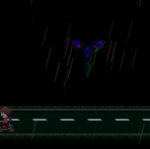
The theme of being watched seems prevalent in Madotsuki's dream, especially with the theme of eyes appearing throughout the dream world. This can obviously be seen in the Eyeball World, but also appears in the Dark Woods and Barracks Settlement with the presence of Isee and in White Desert A with the presence of Eye People. Some other characters with large, singular eyes also appear such as Mars-san. Scattered eyes also appear in different events such as the ああああああああ and Uboa events.
Hands are also scattered throughout the game. Again, the aforementioned Eyeball World is filled with grabbing hands sprouting from the ground. Many locations also have hands or hand-like imagery:
- Staircase of Hands is filled with hands emerging from below the stairway.
- Dark World has a pair of symbols that resemble two hands.
- Graffiti World has a large design of a monkey-like creature clearly showing its hands.
- The White Desert has some sections with large hands and legs. Monoko and The Thing with the Quivering Jaw also have extra arms sprouting from them. The gate that leads to Block World from the White Desert also has a pair of grasping hands.
- Uboa's Trap, a subsection of the White Desert that Uboa teleports the player to, has a nightmarish landscape where a monster with multiple hands grasps hills in the background.
- FC World B has a dirt path design that resembles a pair of hands, one of which holds the entrance to the FC Ruins.
The implication may be that Madotsuki dislikes being touched and prefers a great amount of personal space.
A character who may tie into this theory is Organoid, who is the only NPC to swiftly teleport away upon approach. The many Mall Shoppers also run away from Madotsuki upon interaction.
Body Themes
In Yume Nikki, it is common for NPCs or backgrounds to resemble body parts or inner organs. Also see the Themes of Anxiety theory above for more instances of body parts, particularly eyes and hands, appearing in the game.
Eyeball World is filled with various NPCs that resemble parts of the human body, ranging from legs to lips. The Mouth Monsters, which have large mouths, give hair-related effects. Uteri-shaped creatures also appear on the Infinite Road. Furthermore, some fans suggest that KyuuKyuu-kun, a large colorful worm-shaped creature who is seen rubbing the handrail of a stairway, is phallic imagery, as the character can only be seen by entering through a Zippertile on the wall, which can be interpreted as a pants fly.
Another prominent body-related theme found in the game is the various strabismic NPCs (strabismus meaning to be unable or having problems with fixating both eyes on one point at the same time, leading to the eyes not being aligned). One of the most well known strabismic characters in Yume Nikki is Seccom Masada-sensei. There could be two main reasons for their appearance:
- Madotsuki herself could be strabismic but is hiding it by keeping her eyes closed. There are some structures (such as those in the Pink Sea and Barracks Settlement) and characters (such as the Ghostmen) who slightly resemble chromosomes, which could mean Madotsuki inherited strabismus genetically.
- Another cause of strabismic eyes is through severe brain or head injuries. It should be noted that some strabismic NPCs, notably Dropfish, the Goppa, the Severed Blue Head, and Monoko (when shown during her event) are all strabismic while also seemingly drooling or coughing up blood. It's possible that this links to the themes of violence and traffic accidents found throughout the game (read below sections).
One particular theme relating to the body that seems to appear throughout the game is the theme of pregnancy or childbirth. Takofuusen is an easily identifiable example of this, as it resembles a fetus with the "TRAP sequence" birth defect. Other characters, such as Onsen-san and Manhole-sama, have chord-like appendages that resemble umbilical cords. Alongside this, characters such as the Henkei Shita have large stomachs with thin mouths resembling a surgical cut, which is a trait shared with some of the Mall Shoppers (most notably Obasan) when they distort. The theme of pregnancy could also be an explanation for the instances of characters or structures resembling reproductive organs, characters of which appear to prelude or lead to larger or more terrifying characters in the dream world, such as the Floyag and Manhole-sama eventually leading to the Thing with the Quivering Jaw and the Zippertile and KyuuKyuu-kun leading to FACE, which possibly intend to paint such themes as horrific. These instances have been largely debated by fans on what their possible meaning could be, if any.
The reoccurring theme of body parts throughout Madotsuki's dreams could lead to many interpretations. It's possible she could be afraid of body parts or losing them, as they usually appear around blood or in a gruesome manner such as in Eyeball World or Mural World's Mouth Monsters. Some fans also think that the appearance of characters or structures resembling reproductive organs in her dreams may be linked to a traumatic event or could possibly relate to themes of gender identity (detailed in the Themes of Identity section). As stated above, the inclusion of many strabismic characters could even be related to Madotsuki herself being strabismic, though this is never shown in-game due to her eyes appearing to be closed.
Themes of Violence
Depending on the player's actions, Madotsuki can behave violently towards NPCs and sometimes inanimate objects. She is able to use the Knife effect on almost all of the NPCs with varying results.
While this makes the Knife a prominent effect in the game, it is nevertheless not necessary for gathering effects and thus achieving the ending, and most of the time, can be substituted by the Cat effect for exploring purposes. Even in cases where it is useful for exploring, it will often lead to alarming events such as the Severed Heads in the Sky and FACE events. It could also be argued that Madotsuki, while wielding the Knife effect, is one of the most dangerous characters in the dream world. Even other characters that may seem like enemies or appear to be violent, such as the Toriningen or Uboa, simply trap Madotsuki in isolated locations with no other ill effects, not even doing damage to Madotsuki despite the game's inclusion of a health bar (which may also just be a remnant of the RPG Maker engine used for the game).
Regardless, the Knife is still perceived as a key object in the minds of many fans, leading to them interpreting that Madotsuki or other characters from the game can be prone to acts of violence. Some fans have also theorized that Madotsuki may have had a violent past or was violent herself in the real world, thus why the Knife effect is found in the difficult-to-navigate Dark World (likely as a form of repressed memory) and why Madotsuki isolates herself in her room, possibly out of guilt for a violent act committed in the past.
Themes of Traffic Accidents
Different areas and interactions in Yume Nikki imply that Madotsuki often thinks about traffic accidents of some kind. One prominent example of this is Shitai-san, a dead person on the ground in the Road, surrounded by traffic cones, of whom the Stoplight effect can be gained.
Other instances of vehicle- and crash-related events also occur within the dream world. Seccom Masada-sensei is troubled by his spaceship crashing onto Mars, while Mars-san cries near something that appears to be a crashed locomotive. Near Shitai-san is also a train track, with a Traincar located elsewhere in the same forest.
Some characters also react oddly, sometimes disturbingly, to the Stoplight effect when it is used near them. The faces of the Wheelies will drastically change and Buyo Buyo will freeze while losing its pupil. Another popular example of a character reacting to the Stoplight effect is Monoko, a girl found in one of the tunnels of the White Desert who drastically changes her appearance when the Stoplight is used: she has five arms (one coming out of her head), a wound on her stomach, strabismic eyes with one of them spurting out liquid and an open, seemingly drooling, mouth. Using the Stoplight again restores her appearance. This could be interpreted as Monoko possibly being a person in the real world that may have had relations with Madotsuki, but suffered a vehicle-related accident that Madotsuki witnessed. Her strange appearance when the Stoplight is used could possibly be a less grotesque interpretation of what Madotsuki saw.
One other theme that could possibly further this theory is the occurrence of cones or cone-shapes in the dream world, which could overall symbolize traffic cones (such as the ones that surround Shitai-san, the source of the Stoplight effect). A single traffic cone can be found in the Mall, blocking the area's rooftop, and several conical structures can be found in areas such as the Pink Sea and Face Carpet Plaza. Conical trees are also prevalent in areas such as Forest World, Snow World, and Dense Woods A, the latter of which is connected to where the Stoplight effect is located.
All of these themes have led to theories stating Madotsuki may have had experiences in the real world relating to a traffic accident, possibly alongside family or friends. This would explain why she is alone in her apartment, as those in the traffic accident possibly died or suffered fatal injuries and thus can't be with Madotsuki.
Themes of Escapism
Madotsuki is seemingly trapped inside her room, though it is unknown if this is by choice or if it is due to something out of her control. She remains stuck inside a room with nothing to do except play NASU, write in her diary and sleep. For this reason, some fans believe Madotsuki remains in her dream world as a way to escape the situation that she finds herself in.
While inside her dreams, she can fly across a city sky, explore far more interesting video games, hang out with other people, and travel across the universe. But between all of these things that she can do, it always ends up with her returning to reality, as explained through various events.
All of the events mentioned above are seemingly friendly, but will ultimately lead to Madotsuki waking up anyway in the right conditions. In the Witch's Flight event, she can eventually fall, leading her to wake up. Interacting with a wall in the FC Dungeon leads to scarily glitched graphics alongside a loud noise that wakes Madotsuki. Spending time with Poniko can lead to the Uboa event, which drastically changes the mood of the soundtrack and the surroundings and will teleport Madotsuki to Uboa's Trap, forcing her to wake up if she doesn't have the Medamaude effect. Boarding the space ship can lead to a crash-landing, effectively isolating Madotsuki on Mars.
It could be theorized that these happy events link Madotsuki to the real world, even if she wants to remain dreaming to escape the harsh reality that she lives in.
Themes of Identity
Some factors found within the dream worlds could be seen as representing transgender or other queer identity. Many of the effects relating to appearance, such as the Hair effects, could be seen as representative of appearance or body dysphoria. Many creatures throughout the dream world could also be seen as relating to body dysphoria as well. For example, creatures resembling reproductive organs appear in Madotsuki's dreams, such as the uterus-like Floyag and the phallic KyuuKyuu-kun. Some fans also interpret FACE as such imagery, though another interpretation is that Madotsuki simply dislikes her own facial appearance, considering FACE is presented in a disturbing or distorted manner. The Henkei Shita could also play a role in this theory, as they resemble pregnant or fat people. Many of the more distorted creatures, such as the White Desert monsters and the Sewer Drawings, have abnormal limbs that give off the appearance of something inside them trying to escape, which may be metaphorical for "coming out" in terms of identity. Another thing to note is that a male and female restroom appear in different areas in the dream world, both of which Madotsuki can enter.
The ending of the game can also be interpreted as symbolic. Many fans think that Madotsuki's death and the ending of the game overall represent a "reawakening" of sorts. In the context of transgender or sexual identity, this could be interpreted as coming out or revealing such things publicly, reawakening as a completely new person.
Japanese Folklore
Various NPCs and effects are demons, ghosts, and monsters from Japanese folklore. This suggests that Madotsuki may be interested in or feels personally involved with this theme.
NPCs that heavily resemble creatures of Japanese folklore are:
- The Yuki-onna, who is modeled after the yuki-onna yōkai and bestows Madotsuki the Yuki-Onna effect when interacted with.
- The FC Demon, who might not look like a regular oni, but the Demon effect they give gives Madotsuki the appearance of one.
- The Nopperabou Ghost and Nopperabou Witches, who references the legendary faceless noppera-bō creature. The former also gives out the Nopperabou effect.
- The Ittan-momen, fan-named after the yōkai of the same name. It is a tsukumogami that has been said to be a long cloth that has come to life and flies around, killing people by smothering them. It gives the Towel effect.
- The Toriningen slightly resemble a tengu or baku, two creatures in Japanese mythology that sport long noses. Baku are also notable for devouring dreams, notably nightmares.
Some other effects also appear to relate to Japanese folklore:
- The Cat effect, where Madotsuki becomes a humanoid maneki-neko holding a koban coin. As the maneki-neko is supposed to bring in customers with its good luck, it might explain why NPCs are drawn towards Madotsuki when she paws with her right hand.
- The Triangle Kerchief effect given out by Fleebie. When applying the effect, Madotsuki appears with a hitaikakushi, white triangle-shaped headbands which are often worn by yūrei.
Lucid Dreaming
As Madotsuki can wake herself up at any time in her dream while also having control over her surroundings, she is by definition having lucid dreams. Since she also keeps a dream diary, she remembers at least some things about them, particularly the effects as saving the game could be interpreted as her writing the moments related to effects in her diary in order to remember them and therefore reuse them in the dream world.
Self-induced lucid dreaming is a successful therapy technique for dealing with sleep cycle-affecting mental disorders or illnesses. It is theorized she may have been taught self-induced lucid dreaming to reduce the frequency of nightmares and keeps a dream diary to keep track of her dreams as a self-care exercise.
Separation of Dreams and Reality
At all times during regular gameplay, the dream world and the real world are kept separate, meaning no "unreal" dream elements carry over in the awake moments. During the Witch's Flight event, Madotsuki even falls out of her bed in the real world to indicate that she moved around in her sleep while having a strong dream.
However, during the ending, two Jellyfish appear, while the ending supposedly takes place in the real world. This has raised doubts as to whether the ending is real or just another dream. In fact, some fans believe that Madotsuki is dreaming at every point in the game, citing her perpetually closed eyes, the carrying over of yen after getting pinched awake, and the unrealistic nature of living in an apartment without food or a bathroom as evidence. The blood splatter that appears in the ending also appears several times throughout the dream world, though this is likely either foreshadowing or reusing assets. Others see this theory as a symbol that, even in death, Madotsuki can't escape her nightmares.
